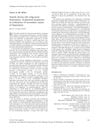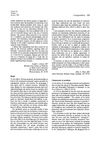August 2016 in “Journal of Investigative Dermatology” EZH2 is essential for hair growth and skin cell development.
 April 2016 in “Proceedings of SPIE”
April 2016 in “Proceedings of SPIE” UV-induced autofluorescence is effective for identifying different types of alopecia.
 December 2015 in “JAMA Dermatology”
December 2015 in “JAMA Dermatology” Dermatologists can help diagnose endocrine disorders like PCOS and metabolic syndrome by looking at skin symptoms.
September 2015 in “Journal watch” Triamcinolone acetonide injections help regrow hair in alopecia areata patients.
 September 2014 in “Springer eBooks”
September 2014 in “Springer eBooks” The document concludes that breast pain should be managed with personalized treatment, starting with non-drug methods and progressing to medication if necessary, while considering side effects and patient needs.
 May 2014 in “Journal of Investigative Dermatology”
May 2014 in “Journal of Investigative Dermatology” Scientists developed tools to observe hair regeneration in real time and assess skin health, using glowing mice and light-controlled genes.
 November 2013 in “Elsevier eBooks”
November 2013 in “Elsevier eBooks” Skin and hair renewal is maintained by both fast and slow cycling stem cells, with hair regrowth primarily driven by specific stem cells in the hair follicle bulge. These cells can also help heal wounds and potentially treat hair loss.
 July 2013 in “NEJM Journal Watch”
July 2013 in “NEJM Journal Watch” The document's conclusion could not be found or understood.
 January 2013 in “Psychiatry and clinical neurosciences”
January 2013 in “Psychiatry and clinical neurosciences” Physical symptoms in depression can reveal underlying medical conditions.
June 2006 in “Experimental dermatology” Hair follicle bulge cells are important for hair survival and help heal the skin after injury, which might be relevant for understanding hidradenitis suppurativa.
 March 2005 in “International Journal of Cosmetic Science”
March 2005 in “International Journal of Cosmetic Science” DVI provides detailed 3D imaging of hair and shows how various products protect and enhance hair.
 January 2003 in “Humana Press eBooks”
January 2003 in “Humana Press eBooks” Dihydrotestosterone and 5α-Reductase play a role in hair loss and prostate health, and finasteride can increase hair growth in men without affecting sperm production, but it doesn't work for postmenopausal women with hair loss.
 November 2002 in “Hair transplant forum international”
November 2002 in “Hair transplant forum international” The IBHRS is now operational.
 May 1997 in “Hair transplant forum international”
May 1997 in “Hair transplant forum international” I'm sorry, but there's no information provided for me to summarize.
 January 1989 in “Journal of The American Academy of Dermatology”
January 1989 in “Journal of The American Academy of Dermatology” Psoriasis patients have immune cells that respond more strongly to signals and stimuli due to an intrinsic cellular defect.
March 2023 in “Медицинский совет” Minoxidil works better for hair regrowth if you have higher SULT1A1 enzyme activity and ATP concentration.
October 2022 in “Reproductive health of woman” Accurate diagnosis and personalized treatment are crucial for managing women's hair loss.
 March 2022 in “International journal of pharmaceutical sciences review and research”
March 2022 in “International journal of pharmaceutical sciences review and research” PCOS is a hormonal issue in women that is usually treated with birth control pills, metformin, and lifestyle changes, with early treatment helping to reduce complications and improve life quality.
 January 2022 in “Klinicheskaya dermatologiya i venerologiya”
January 2022 in “Klinicheskaya dermatologiya i venerologiya” Trichoscopy can diagnose hair loss by looking for common signs like uneven hair thickness, "yellow dots," and more thin hairs, which are found in both men and women.
January 2022 in “Stem cell biology and regenerative medicine” iPSCs could help develop treatments for hair loss.
April 2021 in “Texila international journal of academic research” Both topical and oral finasteride are equally effective for treating male pattern baldness.
 November 2020 in “Journal of The American Academy of Dermatology”
November 2020 in “Journal of The American Academy of Dermatology” Oral JAK inhibitors help regrow hair in alopecia patients.
 June 2020 in “Journal of Evolution of medical and Dental Sciences”
June 2020 in “Journal of Evolution of medical and Dental Sciences” Platelet Rich Plasma (PRP) treatment effectively reduces hair fall and increases hair growth in patients with Androgenetic Alopecia (AGA), but it may cause pain.
![Antiexudative Effects of Finasteride and a New Pyrazolo[C]Pyridine Derivative GIZh-72 in Acetic Acid-Induced Experimental Peritonitis](/images/research/10e636c8-32b7-4d90-b645-80e0039c5960/small/4762.jpg) February 2020 in “Bulletin of Experimental Biology and Medicine”
February 2020 in “Bulletin of Experimental Biology and Medicine” Finasteride and GIZh-72 reduce inflammation, with GIZh-72 being more effective.
January 2020 in “Platelet Rich Plasma in Androgenetic Alopecia- A Prospective Study.” October 2018 in “International Journal of Research in Dermatology” People with androgenetic alopecia are more likely to have metabolic syndrome.
 April 2017 in “Journal of Investigative Dermatology”
April 2017 in “Journal of Investigative Dermatology”
















![Antiexudative Effects of Finasteride and a New Pyrazolo[C]Pyridine Derivative GIZh-72 in Acetic Acid-Induced Experimental Peritonitis](/images/research/10e636c8-32b7-4d90-b645-80e0039c5960/small/4762.jpg)
